International Business Negotiation Essay: Skills and Strategies
VerifiedAdded on 2021/04/24
|19
|4935
|41
Essay
AI Summary
This essay provides a detailed overview of international business negotiation. It begins by defining negotiation and its significance in various contexts, from everyday life to high-stakes international deals. The essay then explores the essential skills required for effective negotiation, including interpersonal skills, analyzing BATNA (Best Alternative To a Negotiated Agreement), negotiating the process, building rapport, and asking smart questions. It delves into the negotiation process, outlining the pre-negotiation, conceptualization, detailing, and follow-up phases. Furthermore, the essay discusses the application of negotiation within the framework of linkage theory and cross-cultural negotiations, emphasizing the importance of understanding cultural nuances for successful outcomes. The content of the essay is based on the works of Lewicki et al. (2011), Chaturvedi (2011), and others, and provides a comprehensive analysis of the topic.

Paraphrase This Document
Need a fresh take? Get an instant paraphrase of this document with our AI Paraphraser
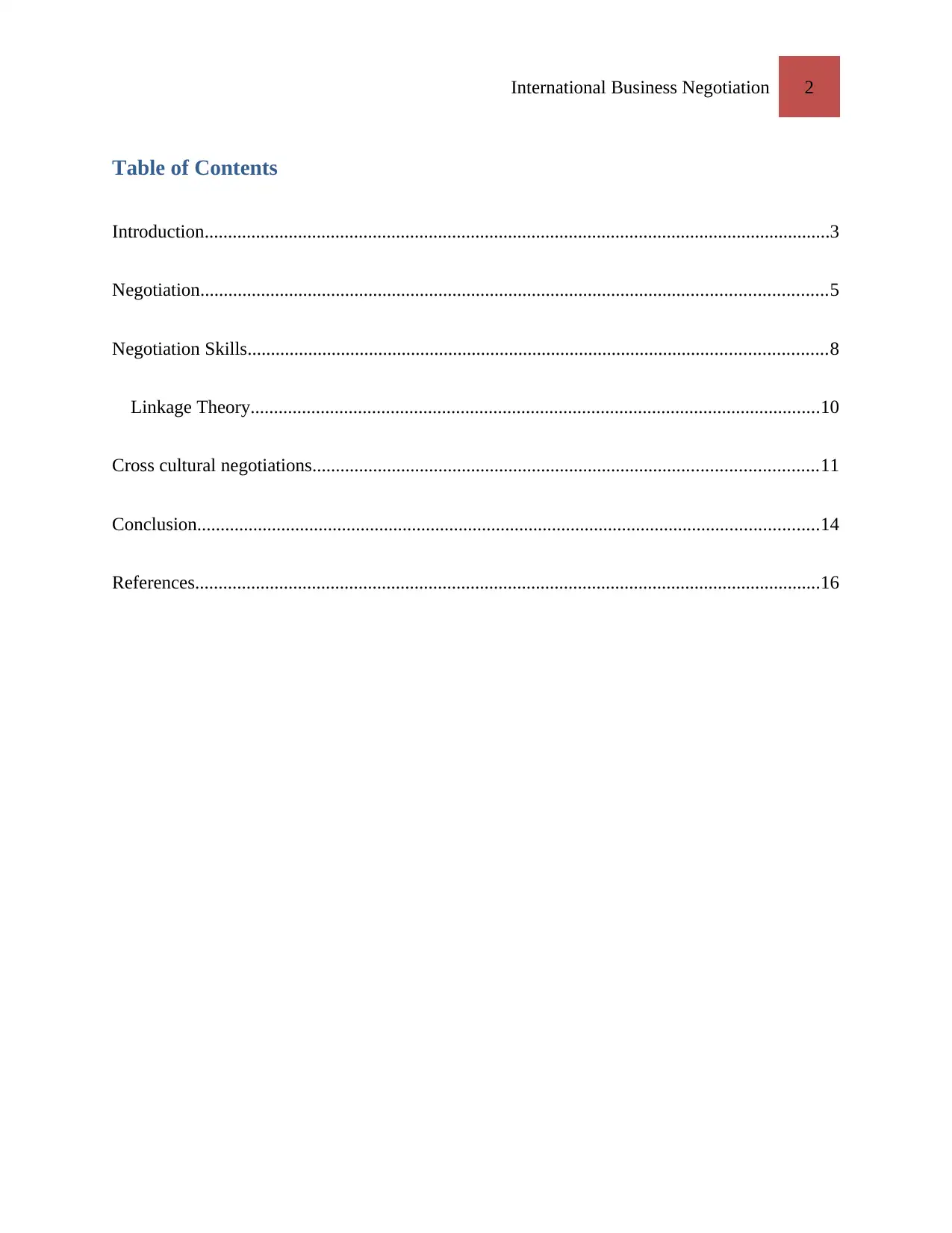
International Business Negotiation 2
Table of Contents
Introduction......................................................................................................................................3
Negotiation......................................................................................................................................5
Negotiation Skills............................................................................................................................8
Linkage Theory..........................................................................................................................10
Cross cultural negotiations............................................................................................................11
Conclusion.....................................................................................................................................14
References......................................................................................................................................16
Table of Contents
Introduction......................................................................................................................................3
Negotiation......................................................................................................................................5
Negotiation Skills............................................................................................................................8
Linkage Theory..........................................................................................................................10
Cross cultural negotiations............................................................................................................11
Conclusion.....................................................................................................................................14
References......................................................................................................................................16
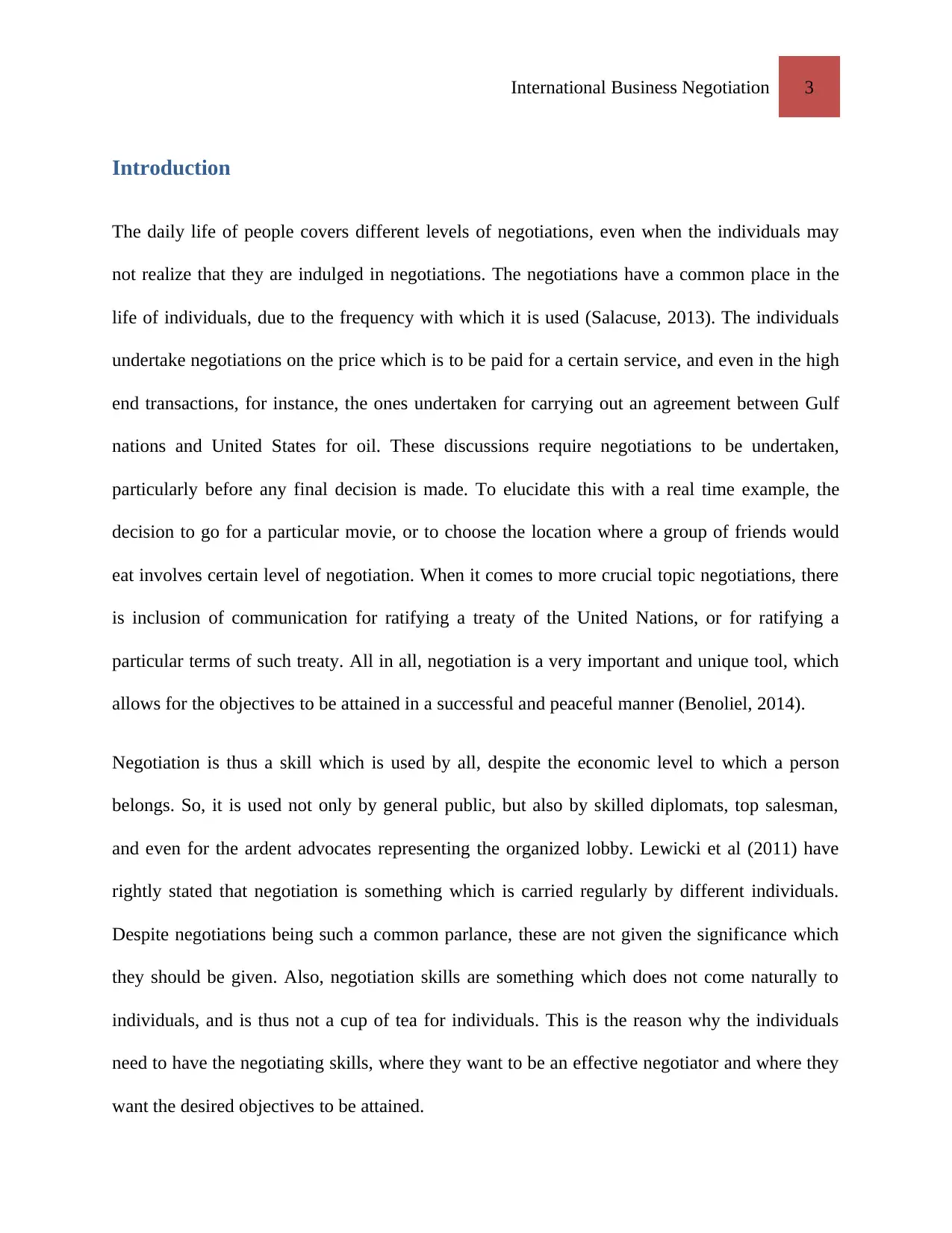
International Business Negotiation 3
Introduction
The daily life of people covers different levels of negotiations, even when the individuals may
not realize that they are indulged in negotiations. The negotiations have a common place in the
life of individuals, due to the frequency with which it is used (Salacuse, 2013). The individuals
undertake negotiations on the price which is to be paid for a certain service, and even in the high
end transactions, for instance, the ones undertaken for carrying out an agreement between Gulf
nations and United States for oil. These discussions require negotiations to be undertaken,
particularly before any final decision is made. To elucidate this with a real time example, the
decision to go for a particular movie, or to choose the location where a group of friends would
eat involves certain level of negotiation. When it comes to more crucial topic negotiations, there
is inclusion of communication for ratifying a treaty of the United Nations, or for ratifying a
particular terms of such treaty. All in all, negotiation is a very important and unique tool, which
allows for the objectives to be attained in a successful and peaceful manner (Benoliel, 2014).
Negotiation is thus a skill which is used by all, despite the economic level to which a person
belongs. So, it is used not only by general public, but also by skilled diplomats, top salesman,
and even for the ardent advocates representing the organized lobby. Lewicki et al (2011) have
rightly stated that negotiation is something which is carried regularly by different individuals.
Despite negotiations being such a common parlance, these are not given the significance which
they should be given. Also, negotiation skills are something which does not come naturally to
individuals, and is thus not a cup of tea for individuals. This is the reason why the individuals
need to have the negotiating skills, where they want to be an effective negotiator and where they
want the desired objectives to be attained.
Introduction
The daily life of people covers different levels of negotiations, even when the individuals may
not realize that they are indulged in negotiations. The negotiations have a common place in the
life of individuals, due to the frequency with which it is used (Salacuse, 2013). The individuals
undertake negotiations on the price which is to be paid for a certain service, and even in the high
end transactions, for instance, the ones undertaken for carrying out an agreement between Gulf
nations and United States for oil. These discussions require negotiations to be undertaken,
particularly before any final decision is made. To elucidate this with a real time example, the
decision to go for a particular movie, or to choose the location where a group of friends would
eat involves certain level of negotiation. When it comes to more crucial topic negotiations, there
is inclusion of communication for ratifying a treaty of the United Nations, or for ratifying a
particular terms of such treaty. All in all, negotiation is a very important and unique tool, which
allows for the objectives to be attained in a successful and peaceful manner (Benoliel, 2014).
Negotiation is thus a skill which is used by all, despite the economic level to which a person
belongs. So, it is used not only by general public, but also by skilled diplomats, top salesman,
and even for the ardent advocates representing the organized lobby. Lewicki et al (2011) have
rightly stated that negotiation is something which is carried regularly by different individuals.
Despite negotiations being such a common parlance, these are not given the significance which
they should be given. Also, negotiation skills are something which does not come naturally to
individuals, and is thus not a cup of tea for individuals. This is the reason why the individuals
need to have the negotiating skills, where they want to be an effective negotiator and where they
want the desired objectives to be attained.
⊘ This is a preview!⊘
Do you want full access?
Subscribe today to unlock all pages.

Trusted by 1+ million students worldwide
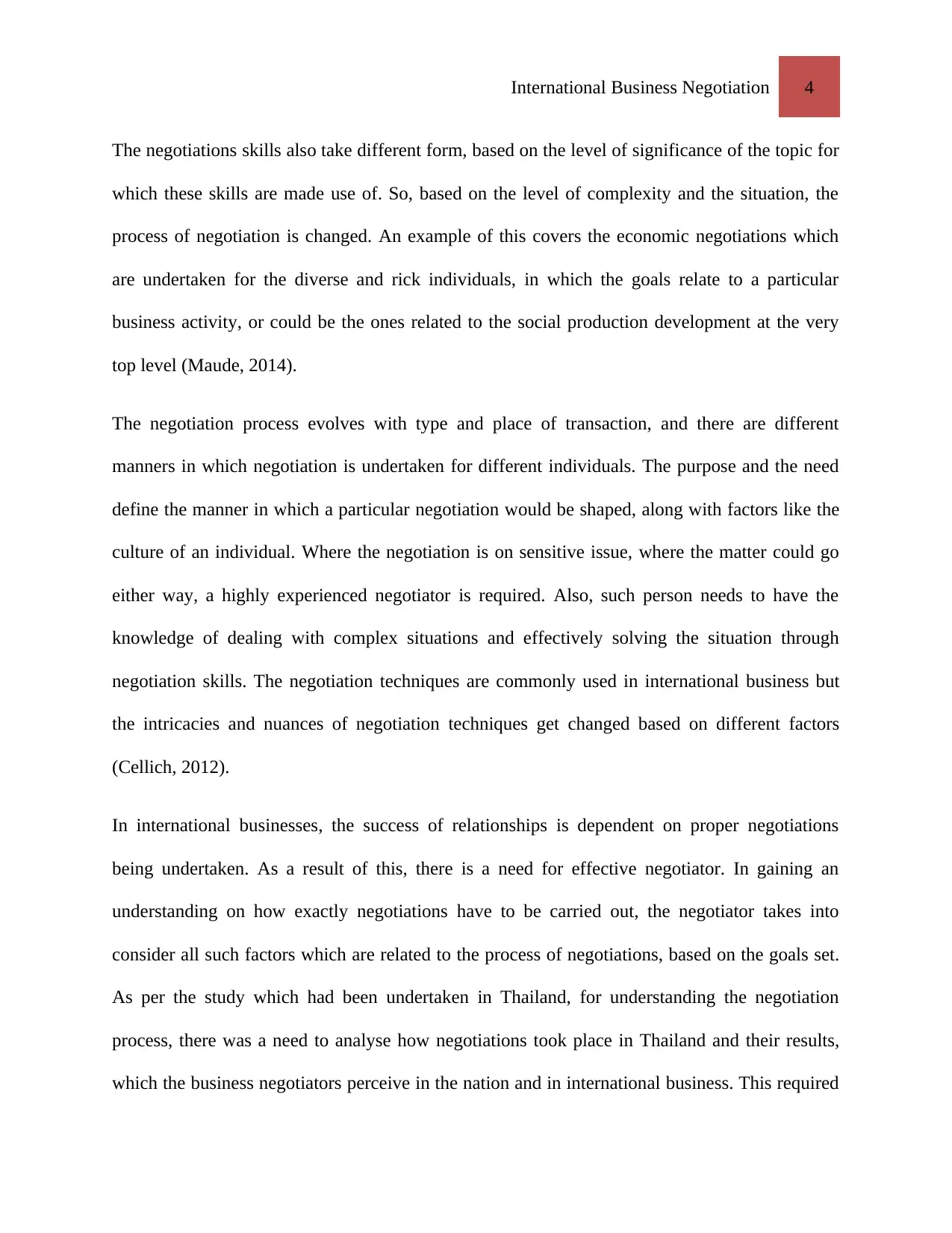
International Business Negotiation 4
The negotiations skills also take different form, based on the level of significance of the topic for
which these skills are made use of. So, based on the level of complexity and the situation, the
process of negotiation is changed. An example of this covers the economic negotiations which
are undertaken for the diverse and rick individuals, in which the goals relate to a particular
business activity, or could be the ones related to the social production development at the very
top level (Maude, 2014).
The negotiation process evolves with type and place of transaction, and there are different
manners in which negotiation is undertaken for different individuals. The purpose and the need
define the manner in which a particular negotiation would be shaped, along with factors like the
culture of an individual. Where the negotiation is on sensitive issue, where the matter could go
either way, a highly experienced negotiator is required. Also, such person needs to have the
knowledge of dealing with complex situations and effectively solving the situation through
negotiation skills. The negotiation techniques are commonly used in international business but
the intricacies and nuances of negotiation techniques get changed based on different factors
(Cellich, 2012).
In international businesses, the success of relationships is dependent on proper negotiations
being undertaken. As a result of this, there is a need for effective negotiator. In gaining an
understanding on how exactly negotiations have to be carried out, the negotiator takes into
consider all such factors which are related to the process of negotiations, based on the goals set.
As per the study which had been undertaken in Thailand, for understanding the negotiation
process, there was a need to analyse how negotiations took place in Thailand and their results,
which the business negotiators perceive in the nation and in international business. This required
The negotiations skills also take different form, based on the level of significance of the topic for
which these skills are made use of. So, based on the level of complexity and the situation, the
process of negotiation is changed. An example of this covers the economic negotiations which
are undertaken for the diverse and rick individuals, in which the goals relate to a particular
business activity, or could be the ones related to the social production development at the very
top level (Maude, 2014).
The negotiation process evolves with type and place of transaction, and there are different
manners in which negotiation is undertaken for different individuals. The purpose and the need
define the manner in which a particular negotiation would be shaped, along with factors like the
culture of an individual. Where the negotiation is on sensitive issue, where the matter could go
either way, a highly experienced negotiator is required. Also, such person needs to have the
knowledge of dealing with complex situations and effectively solving the situation through
negotiation skills. The negotiation techniques are commonly used in international business but
the intricacies and nuances of negotiation techniques get changed based on different factors
(Cellich, 2012).
In international businesses, the success of relationships is dependent on proper negotiations
being undertaken. As a result of this, there is a need for effective negotiator. In gaining an
understanding on how exactly negotiations have to be carried out, the negotiator takes into
consider all such factors which are related to the process of negotiations, based on the goals set.
As per the study which had been undertaken in Thailand, for understanding the negotiation
process, there was a need to analyse how negotiations took place in Thailand and their results,
which the business negotiators perceive in the nation and in international business. This required
Paraphrase This Document
Need a fresh take? Get an instant paraphrase of this document with our AI Paraphraser
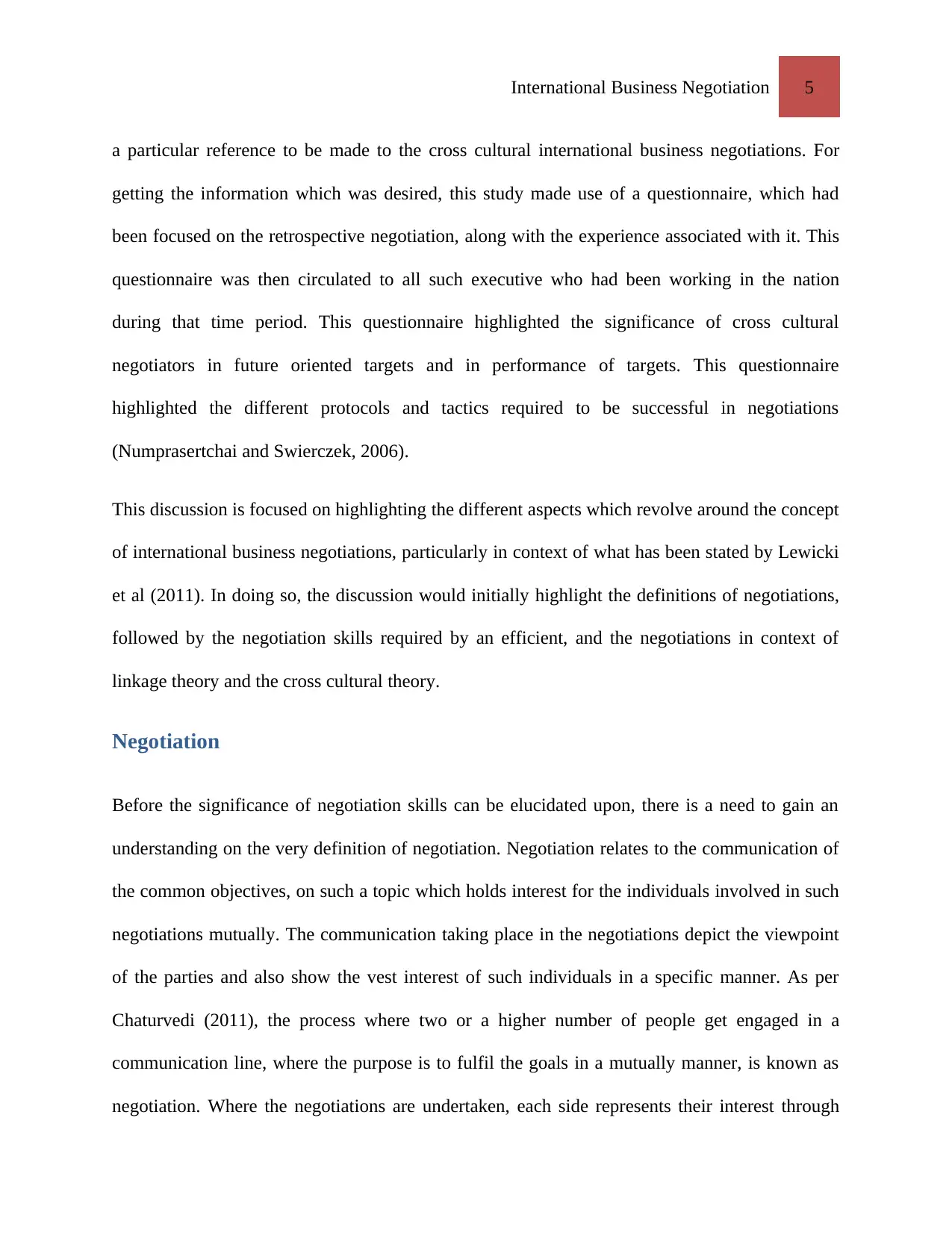
International Business Negotiation 5
a particular reference to be made to the cross cultural international business negotiations. For
getting the information which was desired, this study made use of a questionnaire, which had
been focused on the retrospective negotiation, along with the experience associated with it. This
questionnaire was then circulated to all such executive who had been working in the nation
during that time period. This questionnaire highlighted the significance of cross cultural
negotiators in future oriented targets and in performance of targets. This questionnaire
highlighted the different protocols and tactics required to be successful in negotiations
(Numprasertchai and Swierczek, 2006).
This discussion is focused on highlighting the different aspects which revolve around the concept
of international business negotiations, particularly in context of what has been stated by Lewicki
et al (2011). In doing so, the discussion would initially highlight the definitions of negotiations,
followed by the negotiation skills required by an efficient, and the negotiations in context of
linkage theory and the cross cultural theory.
Negotiation
Before the significance of negotiation skills can be elucidated upon, there is a need to gain an
understanding on the very definition of negotiation. Negotiation relates to the communication of
the common objectives, on such a topic which holds interest for the individuals involved in such
negotiations mutually. The communication taking place in the negotiations depict the viewpoint
of the parties and also show the vest interest of such individuals in a specific manner. As per
Chaturvedi (2011), the process where two or a higher number of people get engaged in a
communication line, where the purpose is to fulfil the goals in a mutually manner, is known as
negotiation. Where the negotiations are undertaken, each side represents their interest through
a particular reference to be made to the cross cultural international business negotiations. For
getting the information which was desired, this study made use of a questionnaire, which had
been focused on the retrospective negotiation, along with the experience associated with it. This
questionnaire was then circulated to all such executive who had been working in the nation
during that time period. This questionnaire highlighted the significance of cross cultural
negotiators in future oriented targets and in performance of targets. This questionnaire
highlighted the different protocols and tactics required to be successful in negotiations
(Numprasertchai and Swierczek, 2006).
This discussion is focused on highlighting the different aspects which revolve around the concept
of international business negotiations, particularly in context of what has been stated by Lewicki
et al (2011). In doing so, the discussion would initially highlight the definitions of negotiations,
followed by the negotiation skills required by an efficient, and the negotiations in context of
linkage theory and the cross cultural theory.
Negotiation
Before the significance of negotiation skills can be elucidated upon, there is a need to gain an
understanding on the very definition of negotiation. Negotiation relates to the communication of
the common objectives, on such a topic which holds interest for the individuals involved in such
negotiations mutually. The communication taking place in the negotiations depict the viewpoint
of the parties and also show the vest interest of such individuals in a specific manner. As per
Chaturvedi (2011), the process where two or a higher number of people get engaged in a
communication line, where the purpose is to fulfil the goals in a mutually manner, is known as
negotiation. Where the negotiations are undertaken, each side represents their interest through
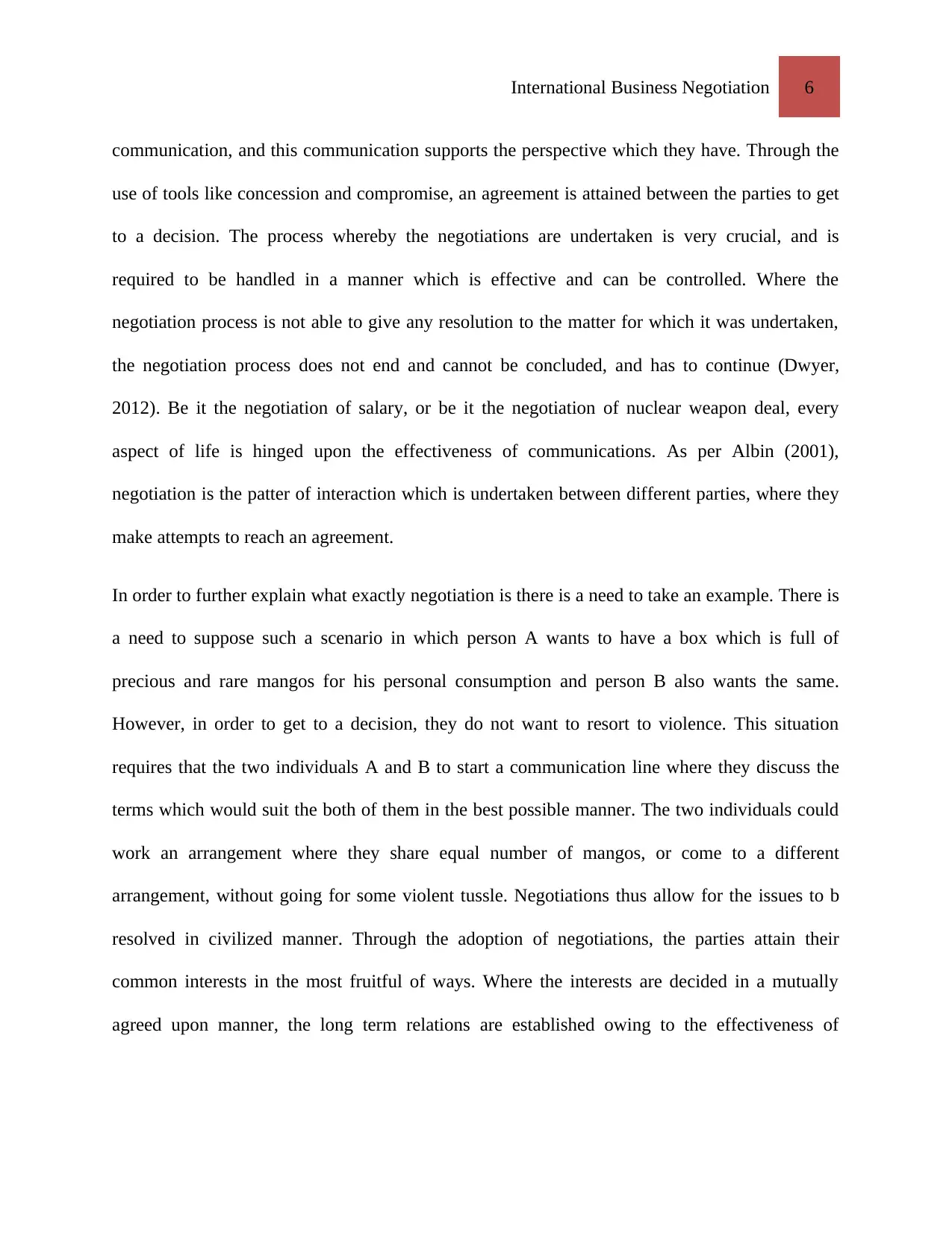
International Business Negotiation 6
communication, and this communication supports the perspective which they have. Through the
use of tools like concession and compromise, an agreement is attained between the parties to get
to a decision. The process whereby the negotiations are undertaken is very crucial, and is
required to be handled in a manner which is effective and can be controlled. Where the
negotiation process is not able to give any resolution to the matter for which it was undertaken,
the negotiation process does not end and cannot be concluded, and has to continue (Dwyer,
2012). Be it the negotiation of salary, or be it the negotiation of nuclear weapon deal, every
aspect of life is hinged upon the effectiveness of communications. As per Albin (2001),
negotiation is the patter of interaction which is undertaken between different parties, where they
make attempts to reach an agreement.
In order to further explain what exactly negotiation is there is a need to take an example. There is
a need to suppose such a scenario in which person A wants to have a box which is full of
precious and rare mangos for his personal consumption and person B also wants the same.
However, in order to get to a decision, they do not want to resort to violence. This situation
requires that the two individuals A and B to start a communication line where they discuss the
terms which would suit the both of them in the best possible manner. The two individuals could
work an arrangement where they share equal number of mangos, or come to a different
arrangement, without going for some violent tussle. Negotiations thus allow for the issues to b
resolved in civilized manner. Through the adoption of negotiations, the parties attain their
common interests in the most fruitful of ways. Where the interests are decided in a mutually
agreed upon manner, the long term relations are established owing to the effectiveness of
communication, and this communication supports the perspective which they have. Through the
use of tools like concession and compromise, an agreement is attained between the parties to get
to a decision. The process whereby the negotiations are undertaken is very crucial, and is
required to be handled in a manner which is effective and can be controlled. Where the
negotiation process is not able to give any resolution to the matter for which it was undertaken,
the negotiation process does not end and cannot be concluded, and has to continue (Dwyer,
2012). Be it the negotiation of salary, or be it the negotiation of nuclear weapon deal, every
aspect of life is hinged upon the effectiveness of communications. As per Albin (2001),
negotiation is the patter of interaction which is undertaken between different parties, where they
make attempts to reach an agreement.
In order to further explain what exactly negotiation is there is a need to take an example. There is
a need to suppose such a scenario in which person A wants to have a box which is full of
precious and rare mangos for his personal consumption and person B also wants the same.
However, in order to get to a decision, they do not want to resort to violence. This situation
requires that the two individuals A and B to start a communication line where they discuss the
terms which would suit the both of them in the best possible manner. The two individuals could
work an arrangement where they share equal number of mangos, or come to a different
arrangement, without going for some violent tussle. Negotiations thus allow for the issues to b
resolved in civilized manner. Through the adoption of negotiations, the parties attain their
common interests in the most fruitful of ways. Where the interests are decided in a mutually
agreed upon manner, the long term relations are established owing to the effectiveness of
⊘ This is a preview!⊘
Do you want full access?
Subscribe today to unlock all pages.

Trusted by 1+ million students worldwide
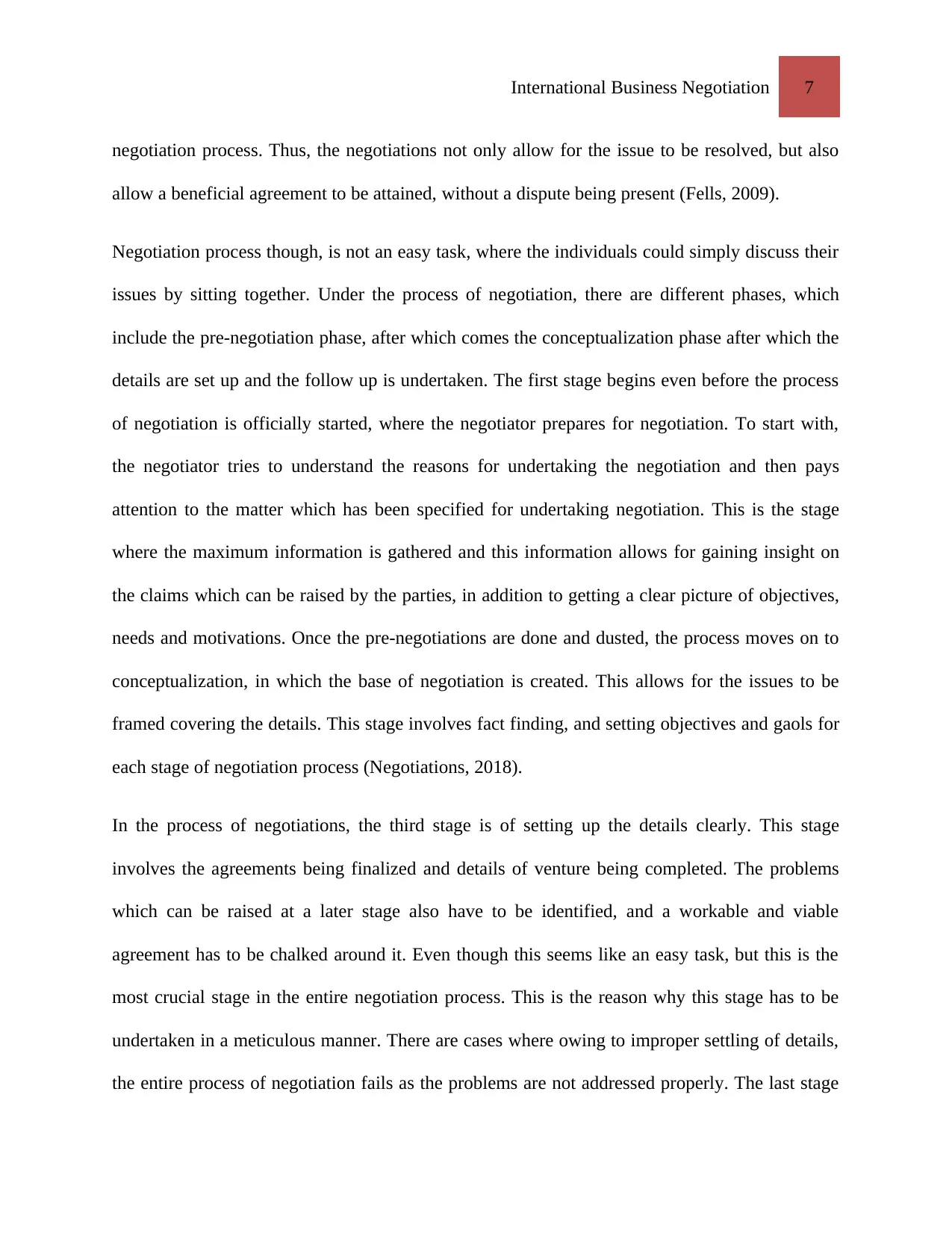
International Business Negotiation 7
negotiation process. Thus, the negotiations not only allow for the issue to be resolved, but also
allow a beneficial agreement to be attained, without a dispute being present (Fells, 2009).
Negotiation process though, is not an easy task, where the individuals could simply discuss their
issues by sitting together. Under the process of negotiation, there are different phases, which
include the pre-negotiation phase, after which comes the conceptualization phase after which the
details are set up and the follow up is undertaken. The first stage begins even before the process
of negotiation is officially started, where the negotiator prepares for negotiation. To start with,
the negotiator tries to understand the reasons for undertaking the negotiation and then pays
attention to the matter which has been specified for undertaking negotiation. This is the stage
where the maximum information is gathered and this information allows for gaining insight on
the claims which can be raised by the parties, in addition to getting a clear picture of objectives,
needs and motivations. Once the pre-negotiations are done and dusted, the process moves on to
conceptualization, in which the base of negotiation is created. This allows for the issues to be
framed covering the details. This stage involves fact finding, and setting objectives and gaols for
each stage of negotiation process (Negotiations, 2018).
In the process of negotiations, the third stage is of setting up the details clearly. This stage
involves the agreements being finalized and details of venture being completed. The problems
which can be raised at a later stage also have to be identified, and a workable and viable
agreement has to be chalked around it. Even though this seems like an easy task, but this is the
most crucial stage in the entire negotiation process. This is the reason why this stage has to be
undertaken in a meticulous manner. There are cases where owing to improper settling of details,
the entire process of negotiation fails as the problems are not addressed properly. The last stage
negotiation process. Thus, the negotiations not only allow for the issue to be resolved, but also
allow a beneficial agreement to be attained, without a dispute being present (Fells, 2009).
Negotiation process though, is not an easy task, where the individuals could simply discuss their
issues by sitting together. Under the process of negotiation, there are different phases, which
include the pre-negotiation phase, after which comes the conceptualization phase after which the
details are set up and the follow up is undertaken. The first stage begins even before the process
of negotiation is officially started, where the negotiator prepares for negotiation. To start with,
the negotiator tries to understand the reasons for undertaking the negotiation and then pays
attention to the matter which has been specified for undertaking negotiation. This is the stage
where the maximum information is gathered and this information allows for gaining insight on
the claims which can be raised by the parties, in addition to getting a clear picture of objectives,
needs and motivations. Once the pre-negotiations are done and dusted, the process moves on to
conceptualization, in which the base of negotiation is created. This allows for the issues to be
framed covering the details. This stage involves fact finding, and setting objectives and gaols for
each stage of negotiation process (Negotiations, 2018).
In the process of negotiations, the third stage is of setting up the details clearly. This stage
involves the agreements being finalized and details of venture being completed. The problems
which can be raised at a later stage also have to be identified, and a workable and viable
agreement has to be chalked around it. Even though this seems like an easy task, but this is the
most crucial stage in the entire negotiation process. This is the reason why this stage has to be
undertaken in a meticulous manner. There are cases where owing to improper settling of details,
the entire process of negotiation fails as the problems are not addressed properly. The last stage
Paraphrase This Document
Need a fresh take? Get an instant paraphrase of this document with our AI Paraphraser
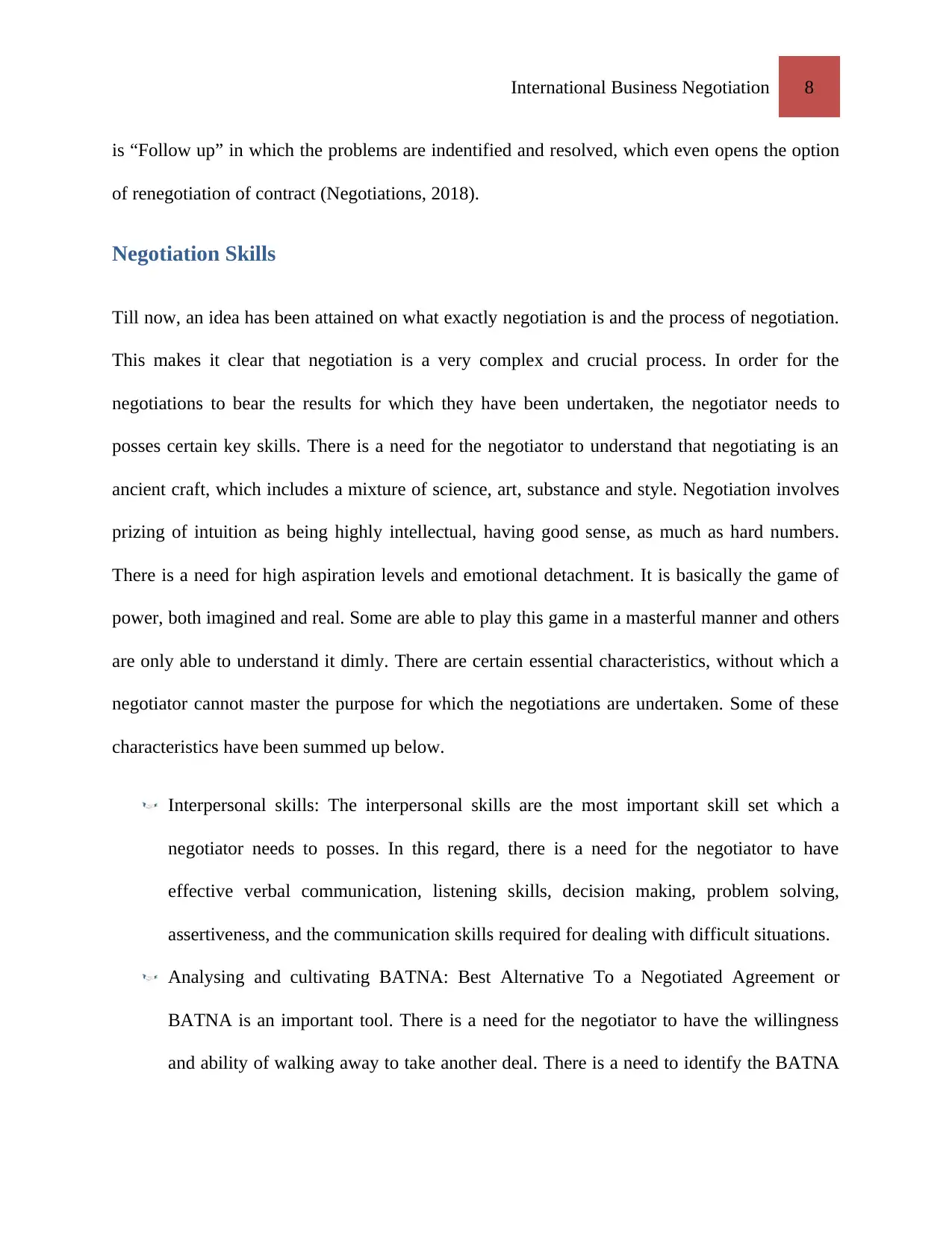
International Business Negotiation 8
is “Follow up” in which the problems are indentified and resolved, which even opens the option
of renegotiation of contract (Negotiations, 2018).
Negotiation Skills
Till now, an idea has been attained on what exactly negotiation is and the process of negotiation.
This makes it clear that negotiation is a very complex and crucial process. In order for the
negotiations to bear the results for which they have been undertaken, the negotiator needs to
posses certain key skills. There is a need for the negotiator to understand that negotiating is an
ancient craft, which includes a mixture of science, art, substance and style. Negotiation involves
prizing of intuition as being highly intellectual, having good sense, as much as hard numbers.
There is a need for high aspiration levels and emotional detachment. It is basically the game of
power, both imagined and real. Some are able to play this game in a masterful manner and others
are only able to understand it dimly. There are certain essential characteristics, without which a
negotiator cannot master the purpose for which the negotiations are undertaken. Some of these
characteristics have been summed up below.
Interpersonal skills: The interpersonal skills are the most important skill set which a
negotiator needs to posses. In this regard, there is a need for the negotiator to have
effective verbal communication, listening skills, decision making, problem solving,
assertiveness, and the communication skills required for dealing with difficult situations.
Analysing and cultivating BATNA: Best Alternative To a Negotiated Agreement or
BATNA is an important tool. There is a need for the negotiator to have the willingness
and ability of walking away to take another deal. There is a need to identify the BATNA
is “Follow up” in which the problems are indentified and resolved, which even opens the option
of renegotiation of contract (Negotiations, 2018).
Negotiation Skills
Till now, an idea has been attained on what exactly negotiation is and the process of negotiation.
This makes it clear that negotiation is a very complex and crucial process. In order for the
negotiations to bear the results for which they have been undertaken, the negotiator needs to
posses certain key skills. There is a need for the negotiator to understand that negotiating is an
ancient craft, which includes a mixture of science, art, substance and style. Negotiation involves
prizing of intuition as being highly intellectual, having good sense, as much as hard numbers.
There is a need for high aspiration levels and emotional detachment. It is basically the game of
power, both imagined and real. Some are able to play this game in a masterful manner and others
are only able to understand it dimly. There are certain essential characteristics, without which a
negotiator cannot master the purpose for which the negotiations are undertaken. Some of these
characteristics have been summed up below.
Interpersonal skills: The interpersonal skills are the most important skill set which a
negotiator needs to posses. In this regard, there is a need for the negotiator to have
effective verbal communication, listening skills, decision making, problem solving,
assertiveness, and the communication skills required for dealing with difficult situations.
Analysing and cultivating BATNA: Best Alternative To a Negotiated Agreement or
BATNA is an important tool. There is a need for the negotiator to have the willingness
and ability of walking away to take another deal. There is a need to identify the BATNA
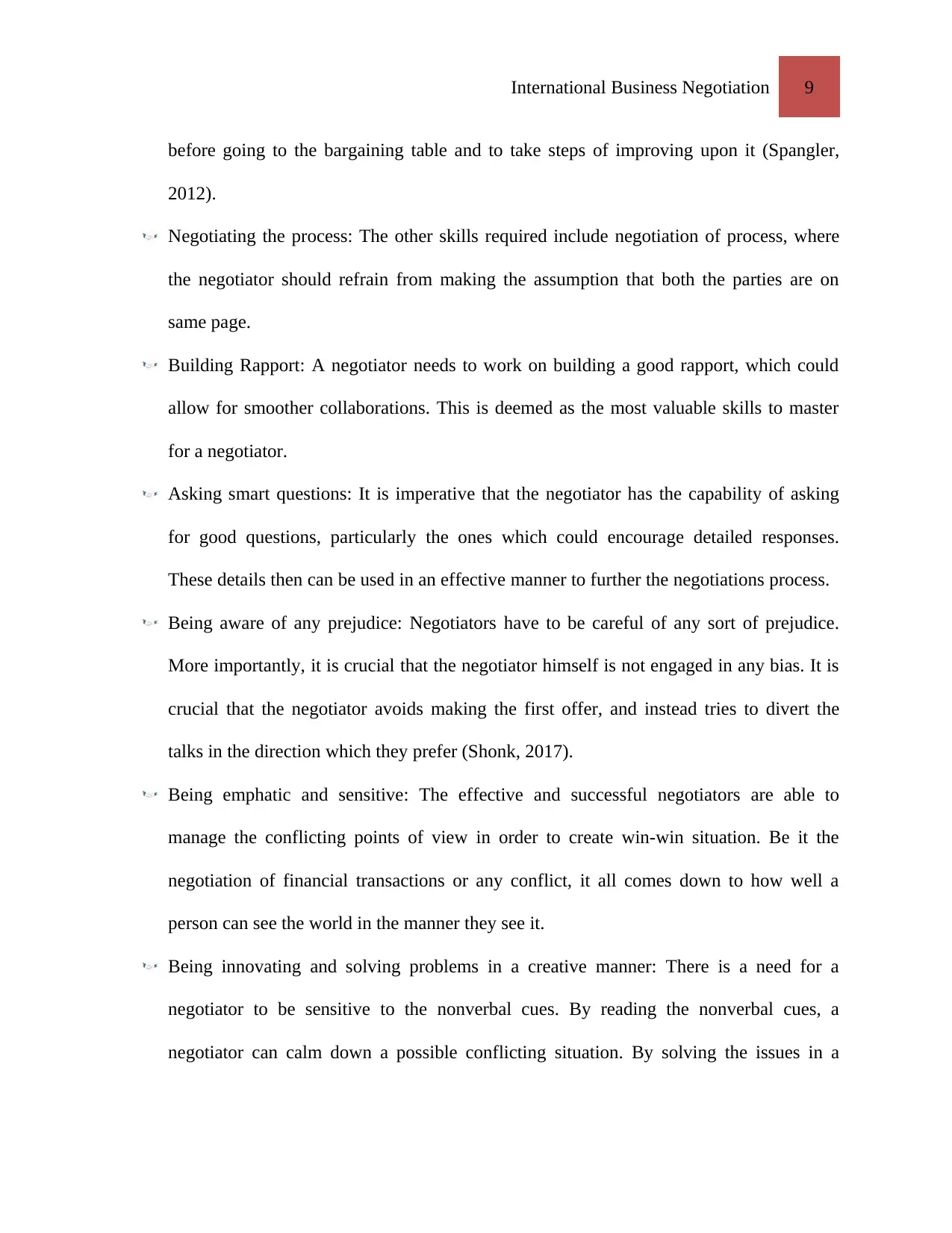
International Business Negotiation 9
before going to the bargaining table and to take steps of improving upon it (Spangler,
2012).
Negotiating the process: The other skills required include negotiation of process, where
the negotiator should refrain from making the assumption that both the parties are on
same page.
Building Rapport: A negotiator needs to work on building a good rapport, which could
allow for smoother collaborations. This is deemed as the most valuable skills to master
for a negotiator.
Asking smart questions: It is imperative that the negotiator has the capability of asking
for good questions, particularly the ones which could encourage detailed responses.
These details then can be used in an effective manner to further the negotiations process.
Being aware of any prejudice: Negotiators have to be careful of any sort of prejudice.
More importantly, it is crucial that the negotiator himself is not engaged in any bias. It is
crucial that the negotiator avoids making the first offer, and instead tries to divert the
talks in the direction which they prefer (Shonk, 2017).
Being emphatic and sensitive: The effective and successful negotiators are able to
manage the conflicting points of view in order to create win-win situation. Be it the
negotiation of financial transactions or any conflict, it all comes down to how well a
person can see the world in the manner they see it.
Being innovating and solving problems in a creative manner: There is a need for a
negotiator to be sensitive to the nonverbal cues. By reading the nonverbal cues, a
negotiator can calm down a possible conflicting situation. By solving the issues in a
before going to the bargaining table and to take steps of improving upon it (Spangler,
2012).
Negotiating the process: The other skills required include negotiation of process, where
the negotiator should refrain from making the assumption that both the parties are on
same page.
Building Rapport: A negotiator needs to work on building a good rapport, which could
allow for smoother collaborations. This is deemed as the most valuable skills to master
for a negotiator.
Asking smart questions: It is imperative that the negotiator has the capability of asking
for good questions, particularly the ones which could encourage detailed responses.
These details then can be used in an effective manner to further the negotiations process.
Being aware of any prejudice: Negotiators have to be careful of any sort of prejudice.
More importantly, it is crucial that the negotiator himself is not engaged in any bias. It is
crucial that the negotiator avoids making the first offer, and instead tries to divert the
talks in the direction which they prefer (Shonk, 2017).
Being emphatic and sensitive: The effective and successful negotiators are able to
manage the conflicting points of view in order to create win-win situation. Be it the
negotiation of financial transactions or any conflict, it all comes down to how well a
person can see the world in the manner they see it.
Being innovating and solving problems in a creative manner: There is a need for a
negotiator to be sensitive to the nonverbal cues. By reading the nonverbal cues, a
negotiator can calm down a possible conflicting situation. By solving the issues in a
⊘ This is a preview!⊘
Do you want full access?
Subscribe today to unlock all pages.

Trusted by 1+ million students worldwide
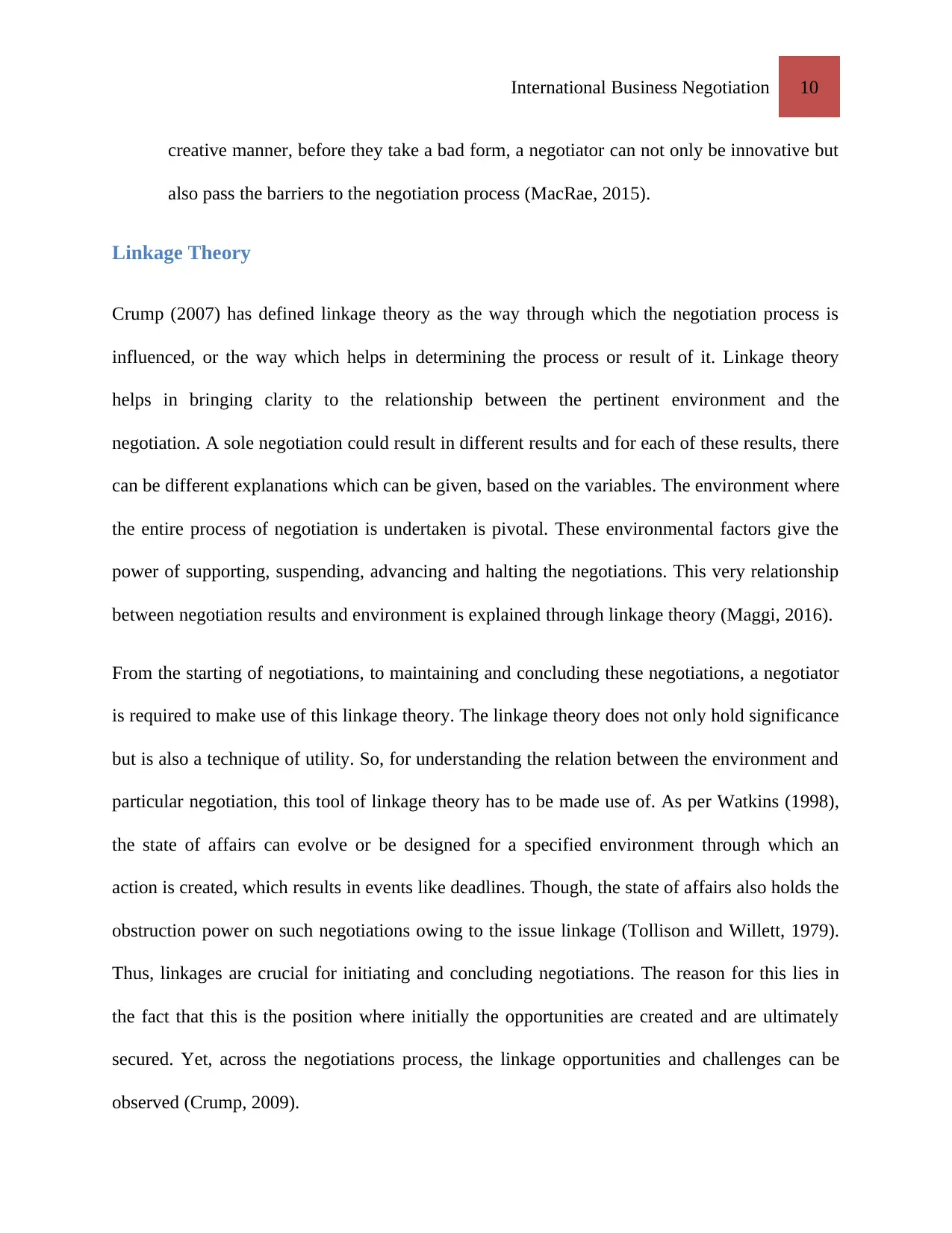
International Business Negotiation 10
creative manner, before they take a bad form, a negotiator can not only be innovative but
also pass the barriers to the negotiation process (MacRae, 2015).
Linkage Theory
Crump (2007) has defined linkage theory as the way through which the negotiation process is
influenced, or the way which helps in determining the process or result of it. Linkage theory
helps in bringing clarity to the relationship between the pertinent environment and the
negotiation. A sole negotiation could result in different results and for each of these results, there
can be different explanations which can be given, based on the variables. The environment where
the entire process of negotiation is undertaken is pivotal. These environmental factors give the
power of supporting, suspending, advancing and halting the negotiations. This very relationship
between negotiation results and environment is explained through linkage theory (Maggi, 2016).
From the starting of negotiations, to maintaining and concluding these negotiations, a negotiator
is required to make use of this linkage theory. The linkage theory does not only hold significance
but is also a technique of utility. So, for understanding the relation between the environment and
particular negotiation, this tool of linkage theory has to be made use of. As per Watkins (1998),
the state of affairs can evolve or be designed for a specified environment through which an
action is created, which results in events like deadlines. Though, the state of affairs also holds the
obstruction power on such negotiations owing to the issue linkage (Tollison and Willett, 1979).
Thus, linkages are crucial for initiating and concluding negotiations. The reason for this lies in
the fact that this is the position where initially the opportunities are created and are ultimately
secured. Yet, across the negotiations process, the linkage opportunities and challenges can be
observed (Crump, 2009).
creative manner, before they take a bad form, a negotiator can not only be innovative but
also pass the barriers to the negotiation process (MacRae, 2015).
Linkage Theory
Crump (2007) has defined linkage theory as the way through which the negotiation process is
influenced, or the way which helps in determining the process or result of it. Linkage theory
helps in bringing clarity to the relationship between the pertinent environment and the
negotiation. A sole negotiation could result in different results and for each of these results, there
can be different explanations which can be given, based on the variables. The environment where
the entire process of negotiation is undertaken is pivotal. These environmental factors give the
power of supporting, suspending, advancing and halting the negotiations. This very relationship
between negotiation results and environment is explained through linkage theory (Maggi, 2016).
From the starting of negotiations, to maintaining and concluding these negotiations, a negotiator
is required to make use of this linkage theory. The linkage theory does not only hold significance
but is also a technique of utility. So, for understanding the relation between the environment and
particular negotiation, this tool of linkage theory has to be made use of. As per Watkins (1998),
the state of affairs can evolve or be designed for a specified environment through which an
action is created, which results in events like deadlines. Though, the state of affairs also holds the
obstruction power on such negotiations owing to the issue linkage (Tollison and Willett, 1979).
Thus, linkages are crucial for initiating and concluding negotiations. The reason for this lies in
the fact that this is the position where initially the opportunities are created and are ultimately
secured. Yet, across the negotiations process, the linkage opportunities and challenges can be
observed (Crump, 2009).
Paraphrase This Document
Need a fresh take? Get an instant paraphrase of this document with our AI Paraphraser
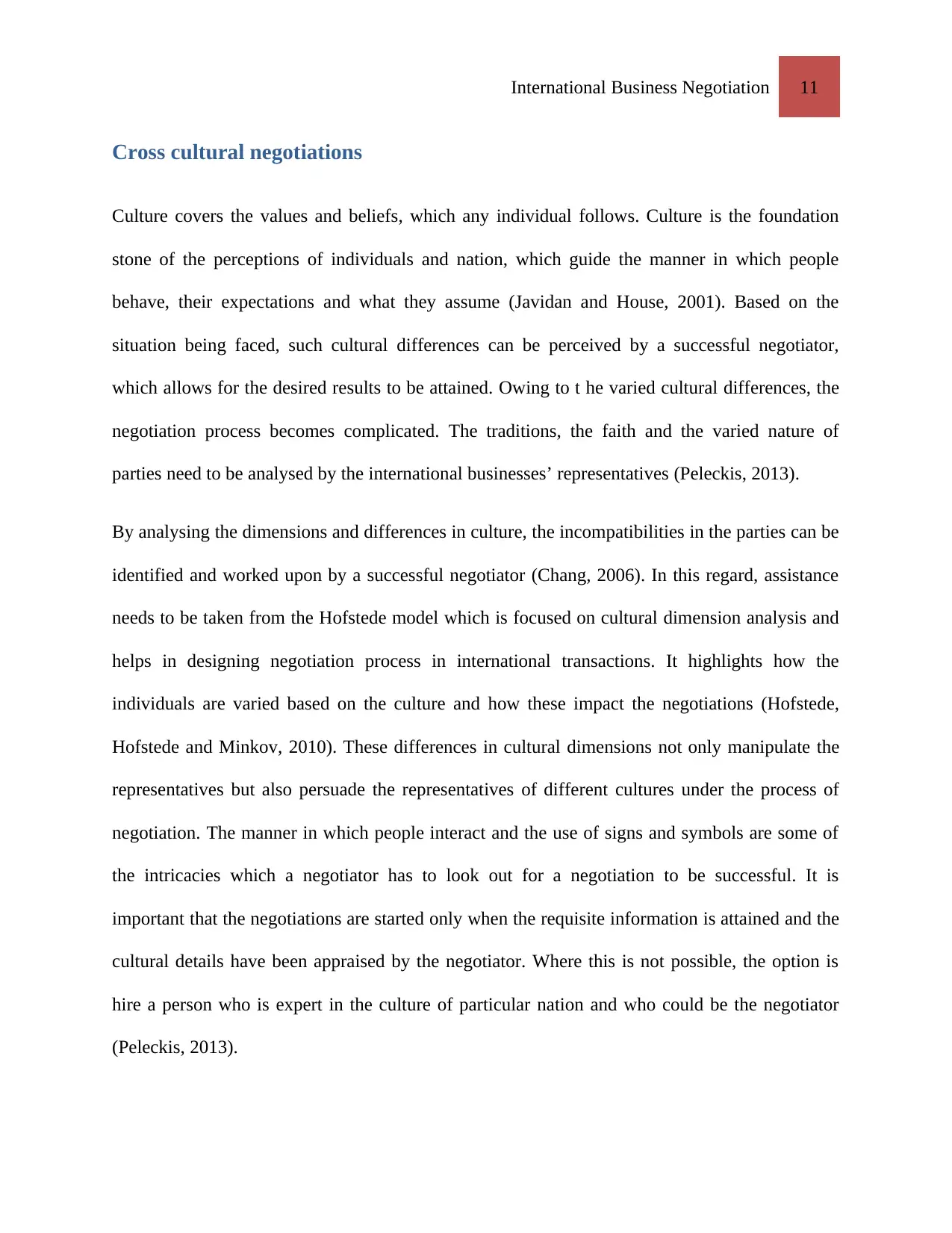
International Business Negotiation 11
Cross cultural negotiations
Culture covers the values and beliefs, which any individual follows. Culture is the foundation
stone of the perceptions of individuals and nation, which guide the manner in which people
behave, their expectations and what they assume (Javidan and House, 2001). Based on the
situation being faced, such cultural differences can be perceived by a successful negotiator,
which allows for the desired results to be attained. Owing to t he varied cultural differences, the
negotiation process becomes complicated. The traditions, the faith and the varied nature of
parties need to be analysed by the international businesses’ representatives (Peleckis, 2013).
By analysing the dimensions and differences in culture, the incompatibilities in the parties can be
identified and worked upon by a successful negotiator (Chang, 2006). In this regard, assistance
needs to be taken from the Hofstede model which is focused on cultural dimension analysis and
helps in designing negotiation process in international transactions. It highlights how the
individuals are varied based on the culture and how these impact the negotiations (Hofstede,
Hofstede and Minkov, 2010). These differences in cultural dimensions not only manipulate the
representatives but also persuade the representatives of different cultures under the process of
negotiation. The manner in which people interact and the use of signs and symbols are some of
the intricacies which a negotiator has to look out for a negotiation to be successful. It is
important that the negotiations are started only when the requisite information is attained and the
cultural details have been appraised by the negotiator. Where this is not possible, the option is
hire a person who is expert in the culture of particular nation and who could be the negotiator
(Peleckis, 2013).
Cross cultural negotiations
Culture covers the values and beliefs, which any individual follows. Culture is the foundation
stone of the perceptions of individuals and nation, which guide the manner in which people
behave, their expectations and what they assume (Javidan and House, 2001). Based on the
situation being faced, such cultural differences can be perceived by a successful negotiator,
which allows for the desired results to be attained. Owing to t he varied cultural differences, the
negotiation process becomes complicated. The traditions, the faith and the varied nature of
parties need to be analysed by the international businesses’ representatives (Peleckis, 2013).
By analysing the dimensions and differences in culture, the incompatibilities in the parties can be
identified and worked upon by a successful negotiator (Chang, 2006). In this regard, assistance
needs to be taken from the Hofstede model which is focused on cultural dimension analysis and
helps in designing negotiation process in international transactions. It highlights how the
individuals are varied based on the culture and how these impact the negotiations (Hofstede,
Hofstede and Minkov, 2010). These differences in cultural dimensions not only manipulate the
representatives but also persuade the representatives of different cultures under the process of
negotiation. The manner in which people interact and the use of signs and symbols are some of
the intricacies which a negotiator has to look out for a negotiation to be successful. It is
important that the negotiations are started only when the requisite information is attained and the
cultural details have been appraised by the negotiator. Where this is not possible, the option is
hire a person who is expert in the culture of particular nation and who could be the negotiator
(Peleckis, 2013).
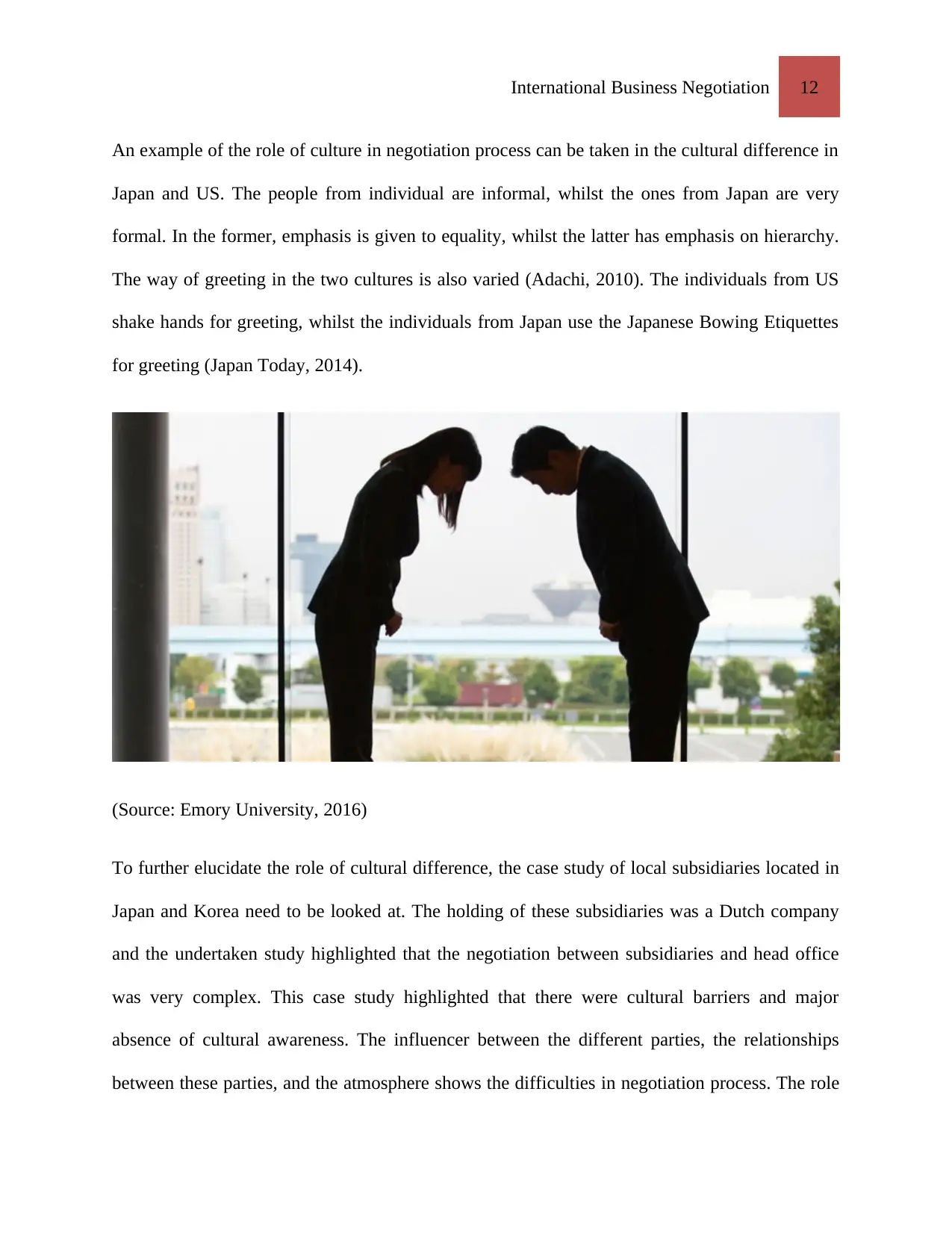
International Business Negotiation 12
An example of the role of culture in negotiation process can be taken in the cultural difference in
Japan and US. The people from individual are informal, whilst the ones from Japan are very
formal. In the former, emphasis is given to equality, whilst the latter has emphasis on hierarchy.
The way of greeting in the two cultures is also varied (Adachi, 2010). The individuals from US
shake hands for greeting, whilst the individuals from Japan use the Japanese Bowing Etiquettes
for greeting (Japan Today, 2014).
(Source: Emory University, 2016)
To further elucidate the role of cultural difference, the case study of local subsidiaries located in
Japan and Korea need to be looked at. The holding of these subsidiaries was a Dutch company
and the undertaken study highlighted that the negotiation between subsidiaries and head office
was very complex. This case study highlighted that there were cultural barriers and major
absence of cultural awareness. The influencer between the different parties, the relationships
between these parties, and the atmosphere shows the difficulties in negotiation process. The role
An example of the role of culture in negotiation process can be taken in the cultural difference in
Japan and US. The people from individual are informal, whilst the ones from Japan are very
formal. In the former, emphasis is given to equality, whilst the latter has emphasis on hierarchy.
The way of greeting in the two cultures is also varied (Adachi, 2010). The individuals from US
shake hands for greeting, whilst the individuals from Japan use the Japanese Bowing Etiquettes
for greeting (Japan Today, 2014).
(Source: Emory University, 2016)
To further elucidate the role of cultural difference, the case study of local subsidiaries located in
Japan and Korea need to be looked at. The holding of these subsidiaries was a Dutch company
and the undertaken study highlighted that the negotiation between subsidiaries and head office
was very complex. This case study highlighted that there were cultural barriers and major
absence of cultural awareness. The influencer between the different parties, the relationships
between these parties, and the atmosphere shows the difficulties in negotiation process. The role
⊘ This is a preview!⊘
Do you want full access?
Subscribe today to unlock all pages.

Trusted by 1+ million students worldwide
1 out of 19
Related Documents
Your All-in-One AI-Powered Toolkit for Academic Success.
+13062052269
info@desklib.com
Available 24*7 on WhatsApp / Email
![[object Object]](/_next/static/media/star-bottom.7253800d.svg)
Unlock your academic potential
Copyright © 2020–2026 A2Z Services. All Rights Reserved. Developed and managed by ZUCOL.





